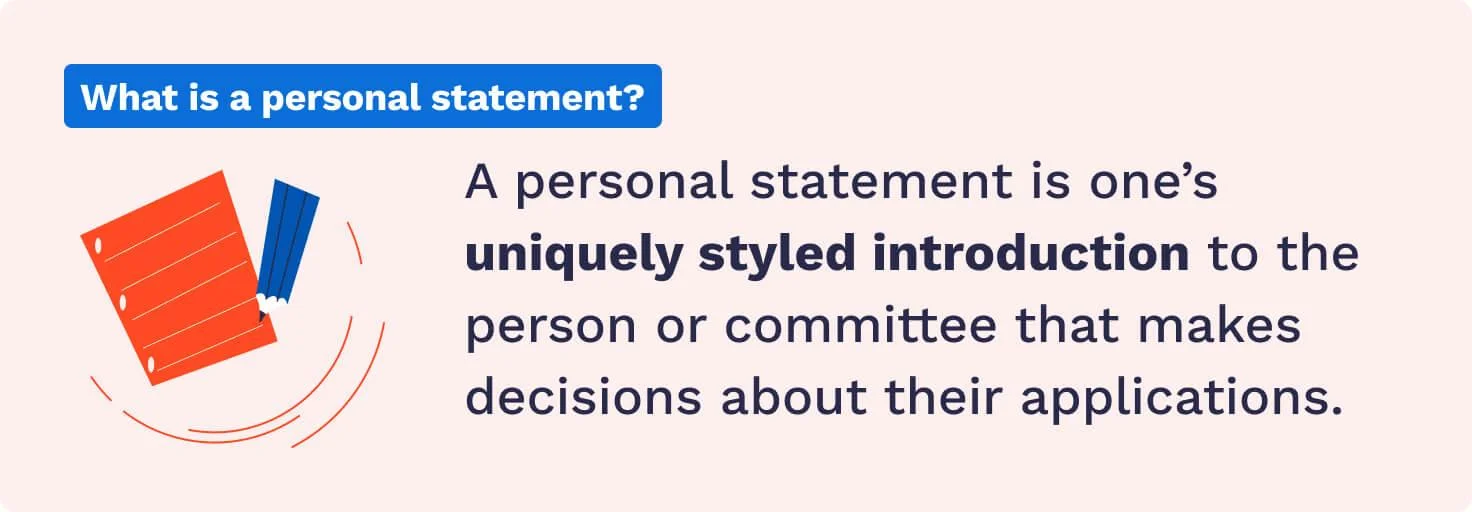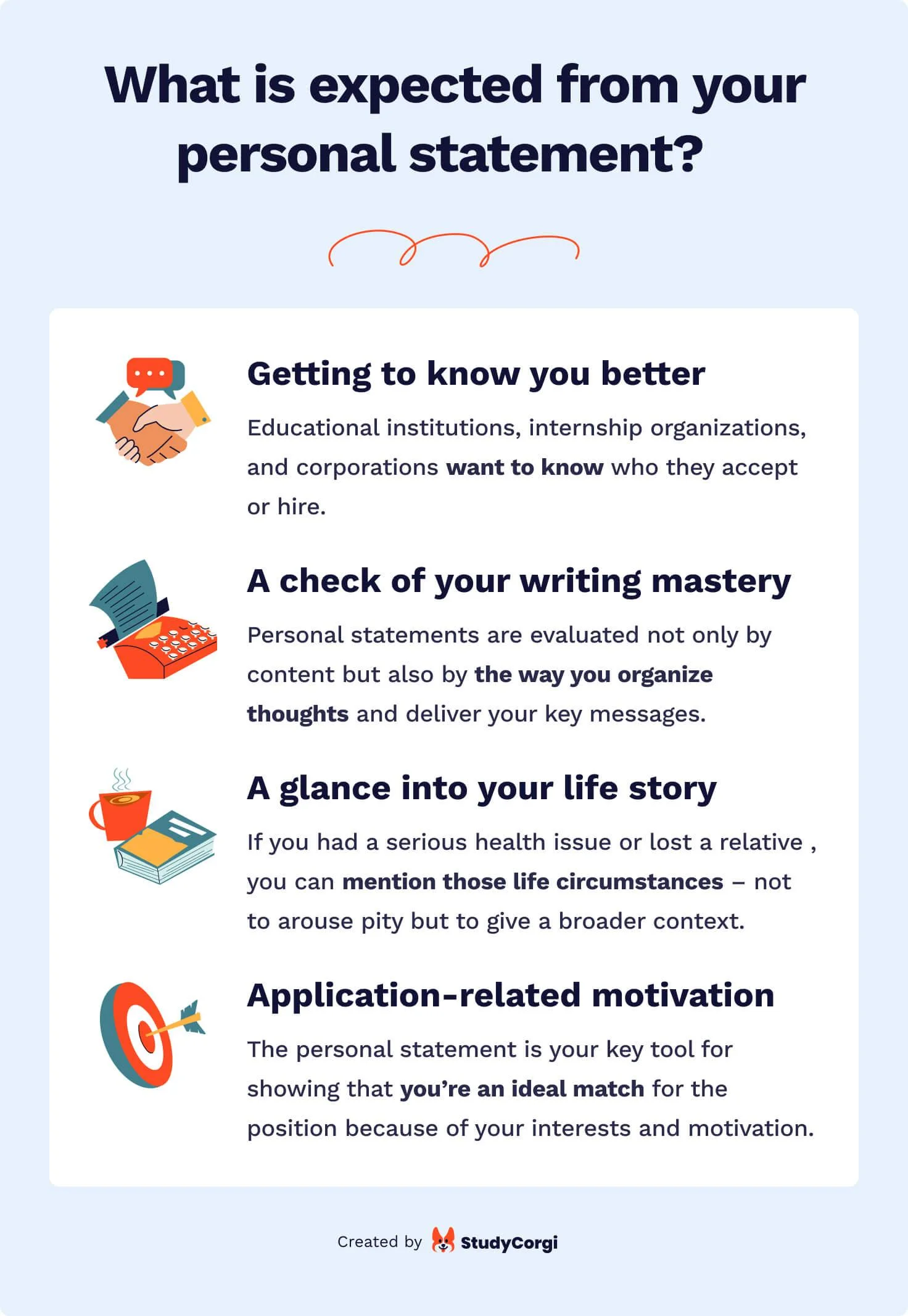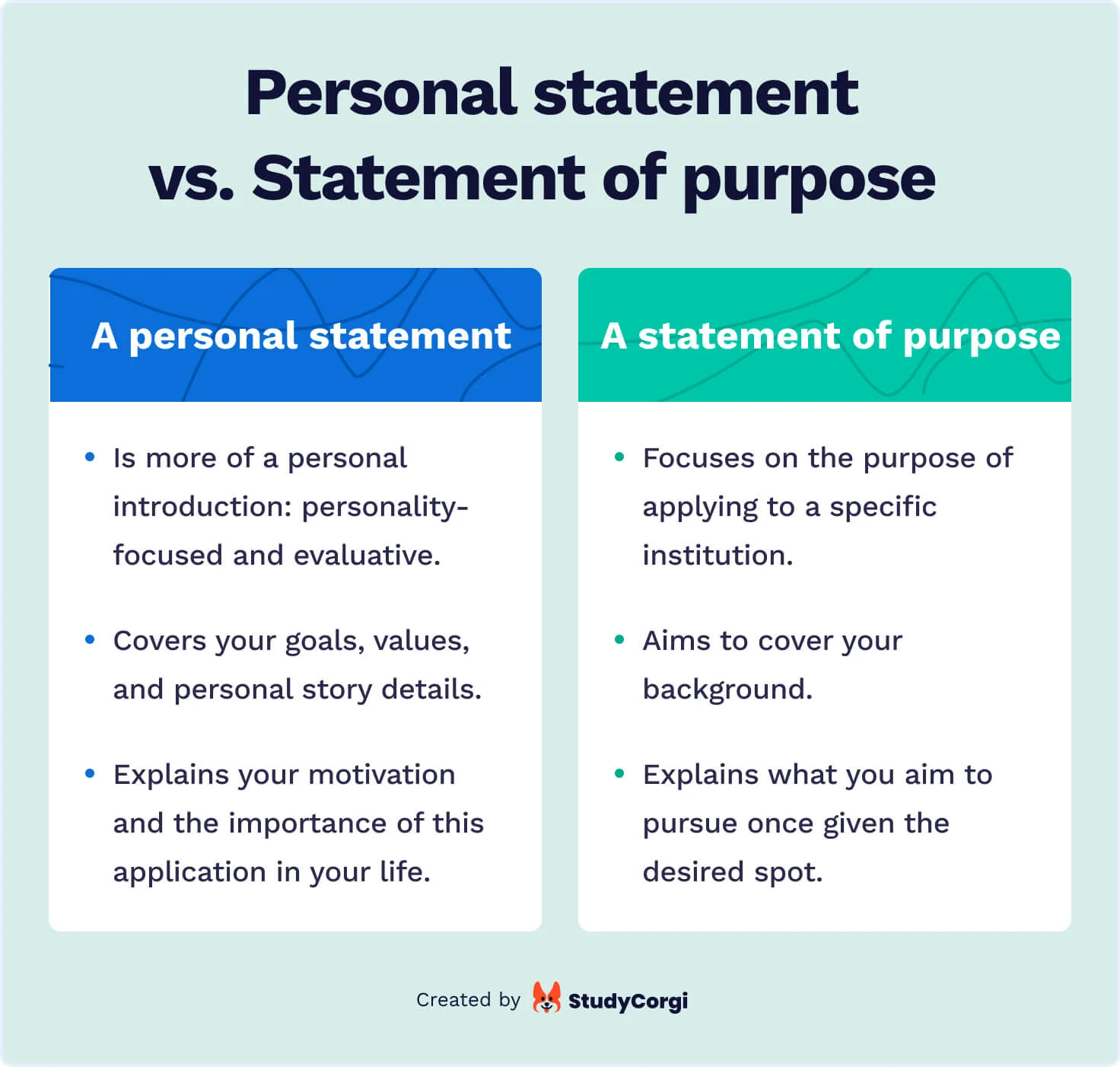📝 Personal Statement Generator – How Does It Work?
If you’re new to creating a personal statement, welcome to our personal statement generator.
It’s a free online statement builder that can give you excellent guidance and workable examples of statements that can impress your employer or admission board.
How to use our personal statement creator?
It’s pretty easy and requires only a couple of steps. You should input the following data into the template:
- Indicate your goal (educational, volunteering, career-related).
- Specify the reason for the planned steps.
- Look at the examples if necessary.
Once the data is fed into the personal statement maker, press “generate” and get a personalized sentence you may tweak further and refine to reflect your individual style and application specifics.
Please don’t over-rely on this tool, as it may not give the ideal personal statement variant at once; it is much better to use it as a source of inspiration for further polishing and fine-tuning.
📋 What Is a Personal Statement?
A personal statement is one’s uniquely styled introduction to the person or committee that makes decisions about their applications.

A good, persuasive, and memorable personal statement should include the following:
- Personal details about the applicant.
- Self-reflection on the person’s strengths and weaknesses relevant to the application.
- Evaluation of their priorities and values relevant to the position.
Notably, some people confuse the role of a personal statement and write it not the way a committee expects them to.
Thus, for disambiguation purposes, you should also note that a personal statement is NOT:
- An academic assignment requiring research.
- A summary of accomplishments.
- A reflective journal.
- Begging for acceptance.
What Is Expected from Your Personal Statement?
Given the purpose of personal statement writing, you are expected to include pretty concrete things in this document. Here are some pro insights into the art of composing an ideal personal statement.

#1 Getting to Know You Better
Colleges, internship organizations, and corporations want to know who they accept or hire. Thus, a personal statement is a good chance to learn more about the contenders and choose those whose stories speak to them and resonate with their mission and vision.
#2 A Check of Writing Mastery
Personal statements are evaluated not only by content but also by the way you organize thoughts and deliver your key messages. Therefore, be ready to polish this document many times for it to look professional and elegant.
#3 A Deeper Glance into Your Life Story
In some cases, you will need to explain gaps or troubling points in your resume or academic record. For example, you may have a seriously lower GPA one year compared to others, and that fact can push the committee away from your candidacy. But if you had a serious health issue or lost a relative during that period, you can mention those life circumstances – not to arouse pity but to give a broader context.
#4 Application-related Motivation
Finally, the personal statement is your key tool for showing that you’re an ideal match for the position because of resonating values, interests, and motivation. By explaining why you apply to a specific organization, you can bridge the gap and show why you can become a valuable asset for the entity of your interest.
🆚 Personal Statement vs. Statement of Purpose
Now, let’s briefly recap the difference between two documents you might be required to submit – a personal statement vs. statement of purpose.

No matter how similar their names look, there are still some notable distinctions to remember.
- Statement of purpose (SOP). As its name suggests, the SOP focuses on the purpose of applying to a specific institution. You should briefly cover your background to show how you have arrived at this decision and what you aim to pursue once given the desired spot.
- Personal statement. It’s more of a personal introduction that covers your goals, values, and personal story details. You can dive deeper into your motivation and the importance of this application in your life.
This way, as you can see, SOP summarizes relevant qualifications and targets the applicant’s plans to achieve their professional goals, while a personal statement is more personality-focused and evaluative.
📍 How to Write an Effective Personal Statement
Here are a few steps you may take to improve the quality of your personal statement:
How Long Should a Personal Statement Be?
Personal statements are usually required to include anywhere from 500 to 1,000 words, as the committee wants to give applicants enough space to introduce themselves while following a clear, concise manner of self-expression.
💡 Personal Statement Titles
If you’re not given a specific topic for a personal statement, you may find it hard to pick the right title. Here are some tips to go ahead with the topic:
- Apply brainstorming to get as many ideas as possible and then evaluate them to pick the best.
- Talk to people who know you well. Even if it seems that you have nothing interesting to tell, they can highlight some exciting aspects of your personality.
- Be sincere to yourself and the committee. Think about what lights you up, inspires, and brings meaning to your life. Don’t try to present yourself as somebody else; people feel that and lose trust in your story.
Here is a brief list of suggestions that may turn you on the right path:
- Hobbies that you have.
- Social problems and issues that worry you.
- Your volunteering experience.
- Academic subjects that cause your agile interest.
- Local or international events of your interest.
- Your core values.
- Your most deeply hidden vulnerabilities.
Thank you for reading this article!
You’ll probably find useful our other online tools:
Updated:
🔗 References
- Writing the Personal Statement – Purdue OWL
- How to Write a Powerful Personal Statement | Indeed.com
- How to Write a Powerful Personal Statement | Grammarly Blog
- How to start a personal statement | Birmingham City University
- Personal statement | Study | Imperial College London
- Statement of Purpose vs Personal Statement